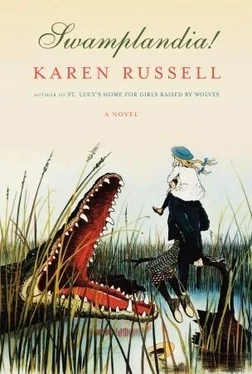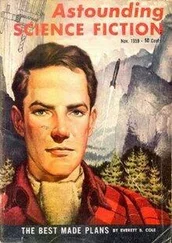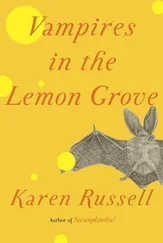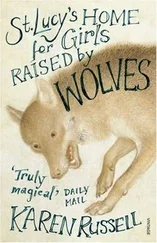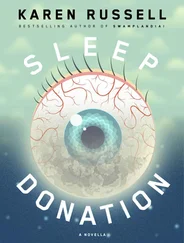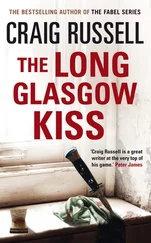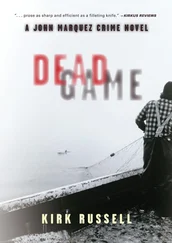Ahead of me, through the tiny squares of the veil, I viewed saw grass for aeons, saw grass with no end in sight. These were the deadlands, the flatlands, I assumed now, the place that the Bird Man had been referring to all along. The plants grew razor-straight, and they were almost twice my height, nine feet tall and fingered with so many tiny knives. Ghost gray or yellowish gray or a dull waspy brown, the colors shifting subtly as clouds passed over them; there was no other variation in any direction on the monotone prairie. The stalks grew out of a calcareous marl, hidden under three feet of water, a soil that crumbles under your weight. My heart sank; my life wasn’t going to be long enough to reach the end of this place.
But I walked anyways. I tried not to know that I wasn’t going to make it, to undo that knowledge like a knot.
I buttoned Louis Thanksgiving’s shirt right up to the collar.
I tightened Ossie’s ribbon and I double-knotted the mosquito veil.
I squeezed my mom’s scraplet into my fist.
As I walked I told myself a story — I imagined myself as Louis Thanksgiving. I mean I actually pictured myself inside of him. Black hair and swinging elbows. When I closed my eyes I pretended I was Louis, being carried. I could see him rising like a limp balloon into the clouds beneath the birds’ beating wings. Through Louis’s eyes I saw the dark green tops of the trees, the Argus eyes of the secret lakes and sloughs opening for us as we drifted up. Then Louis Thanksgiving was carried so high that he couldn’t see anything besides his own sun-freckled hands. They swung beneath him in two pale green cones of space. The trees vanished. Ice lands whispered up in sulfur curls. The world below him had no rocks, no terrestrial scars, it was fathoms of air and evening blue. The last lakes looked small as stars. Two sets of iron-gray talons dug like prongs into the meat of his shoulders. And I could feel them, under the jacket, eight points of pressure against my sternum.
This wasn’t a real possession: I could also feel the mud squeeze into my sneakers, hear thunder. I could fold Louis’s thin collar under my fingers and inhale the chalky mosquito wire. I wasn’t Ossie, lost in my big trance — I was just myself telling myself a story. But I wouldn’t have made it very far without the Dredgeman’s Revelation, which distracted me from the pain of sunburn and thirst. If I looked up and saw the buzzards wheeling in the thermals like black motes in a blue eye, I forced myself to relocate my gaze to my sneakers and start again: The dredgeman had a name, Louis Thanksgiving … My own thoughts were like bad food, so instead I told myself the story of Louis Thanksgiving fishing for bowfin on the deck of the dredge barge, and Louis Thanksgiving lost and happy in the Black Woods, Louis swimming under the wheel with the captain’s knife in his mouth, until I became Louis, walking.
Rain began and ended, I don’t know how many times. Light faded like water draining into a hole. Through the mosquito veil the endless prairie ordered itself into tiny squares and I kept moving through them. Who knows how long I spent wading through those serrated grasses? I must have recited the Dredgeman’s Revelation at least a hundred times forward and backward. I added a new ending: in my version, the dredgeman escaped, and lived. The little hand of a clock sprung back, and Louis Thanksgiving drew breath. The engine room gasped its flames into the wood, and the explosion never happened. Birds shrank away into a fatal yellow moon. Everybody, all the dredgemen, they survived.
At first I didn’t understand the scene in front of me: forty-odd yards from where I was standing the line of saw grass ended, and I could see beyond it to maple and bay trees and the brown water of an alligator hole. I was within sight of a sudden elevation — six or seven feet, a spectacular height in this part of the swamp — where the ten-foot-tall stalks sheared away quite suddenly and became dimpled rock. The eternity I’d seen ended as cleanly as if someone had run a scythe through it. I chanced a look at the sky: towering clouds were moving swiftly toward me, as big as white ships. The skies were beautiful here, and empty.
CHAPTER TWENTY-TWO. Kiwi Takes to the Skies
Vijay and Kiwi were ripping Moo Cow creamers for their coffees at the Burger Burger. They kept tossing the crenellated pink containers onto the restaurant table until it looked like a Ken doll had gone on some unmanly daiquiri bender. They’d both ordered the A.M. Delicious! Dollar Breakfast Combo #2: cheddar, sausage, and egg sandwiches. You got what you paid for in this life, said Vijay through a nuclear yellow mouthful of fast-food cheese.
“Sure hope you don’t crash today, Bigtree.”
“Okay, are you serious? Can we talk about anything else? That is unduly ominous for daybreak.”
Kiwi pronounced “ominous” so that it rhymed with “dominoes.”
“Huh? You’re om-in-ohs, bitch. Bro, you’re jumping the whole table. Bigtree: is a shark eating you below the waist or something? Calm it down. It’s going to be fine.”
Kiwi saw that his long legs were indeed bucking the half-moon of their Formica table. The salt and pepper shakers were doing little NBA jumps.
Kiwi was wearing Leo’s oxford shirt, even though it was 90 degrees out, to disguise the bruises he’d gotten from his grandfather. He’d thought about trying to pass them off as hickeys from Emily Barton, but he had several on his arms.
Kiwi wished that he could tell Vijay about Grandpa Sawtooth. He kept thinking about the moment when he’d lifted the old man by his frail shoulders and his eyes had widened, full of an animal pain. Even then Kiwi hadn’t released him.
They were both sitting on the same side of the booth, as if they were copilots of the fast-food rocket ship, Kiwi said, to indigestion and Grade D regret. Kiwi found a crack in the upholstery and started pinching up curly stuffing.
Outside the restaurant window, a bag lady of an advanced, indeterminate age marched forward in front of their window, her face lost in a glassy tangle of curls. Her hair was shockingly white. Red and yellow flags of cloth waved all along her shopping cart like a little parade. She had such an accumulation of crap in there, none of it particularly eyecatching: Kiwi’s gaze snagged on a clock radio, a doll with a gouged cheek in a gray and red-ribboned party dress. Enough metal rods to build a really crappy organ. Things so generic that they caused Kiwi a pang; at first he thought he’d recognized them. Bigtree tribal artifacts! he’d thought — really, it was the same junk that every family had.
There was a story that traveled around the islands about a woman named Mama Weeds. A swamp witch. But now Kiwi saw that there were witches everywhere in the world. Witches lining up for free grocery bags of battered tuna cans and half-rotted carrots at the downtown Loomis Army of Mercy. At the bus station, witches telling spells to walls. Only the luckiest ones got to live inside stories. The rest were homeless, pushing carts like this one. They sank out of sight, like the European witches clutching their stones.
“What are you staring at? Are you checking her out?” He peered at the bag lady. “She’s a little old for you, Bigtree.”
“Bro! No. I’m staring at the, ah. The rods. Sure are a lot of rods in there.”
“Rods!” Vijay did his mimicry of a persnickety white man. He started out seriously and then shifted into sniggers, a speech habit of Vijay’s where he dropped the mic midsentence and became his own audience. “If you love rods , son, you go right ahead. That’s your lifestyle choice … ”
“Huh? Oh, right. I forgot. I’m gay. Ha-ha. Very funny.”
Читать дальше
